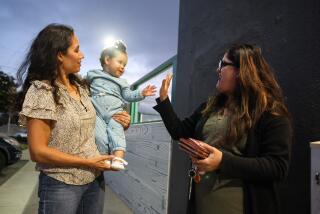COUNTYWIDE : Medical Examiners Take High-Tech Tour
The slices of human brain tissue sitting on a wooden slab were no new sight for Dr. Pedro Ruiz Chunga. Neither was the pale cadaver that was wheeled through the rear door of the Orange County Forensic Sciences laboratory in Santa Ana--better known as the county morgue.
But the cramped room that houses the county’s 10-month-old DNA laboratory stopped him in his tracks.
The questions, asked in Spanish, rolled from his mouth quickly.
“Does this help your investigations?” the Peruvian medical examiner asked. “How many convictions have you had? Can you use it for paternity suits?”
Chunga was one of six medical examiners from Peru, Bolivia, Panama, Honduras, Guatemala and the Dominican Republic who wandered the county morgue Wednesday.
While participants of the American Academy of Forensic Sciences convention began to gather for a four-day stay in Anaheim, the Latino medical examiners took advantage of a programming lull to get a first-hand look at a modern forensic sciences facility.
For two hours in the afternoon, the Orange County coroner’s office played host to the doctors, all of whom are also university professors in their countries.
Although the doctors said they learned few new techniques in the art of forensic sciences during their tour, they were impressed by the level of sophistication found at the forensic sciences facility.
“We have only our hand and minds to help,” Chunga said. “You have the equipment.”
Indeed, the county’s Cal ID fingerprinting system and DNA lab are two of the newest pieces of equipment that the forensics laboratory uses--to identify not only victims but criminals as well.
“They think that much of what we have is amazing,” coroner’s spokeswoman Bernice Mazuca said. “These are things we take for granted.”
James D. Beisner, chief deputy corner, added: “We thought it would be a good thing to do, to provide them with our experience and for them to share their experience with us.”
The tour was not the only chance that the medical examiners had to share their experiences and knowledge with others in forensic sciences. The American Academy of Forensic Sciences Convention, held each year in a different U.S. city, is offering more than 2,000 participants from around the world a chance to discuss and share information in the wide-ranging field.
Forensic sciences are the study of science as it applies to law, convention spokeswoman Ann Warren said.
The convention will end Saturday.
Dr. Dennis Castro, chief medical examiner for the Honduran Supreme Court, said the most important aspect of the short tour was that it gave the examiners a contact in the United States: Before the tour was completed, chief deputy Beisner had struck an informal cooperation accord with the examiners to allow them to contact the coroner’s office for future aid.
The tour also marked the first time that the Latino examiners had met each other. They promised to work more closely in the future.
“That is the purpose behind everybody coming here and getting together,” said Dr. Andres Tucher Lay of Panama.
More to Read
Sign up for Essential California
The most important California stories and recommendations in your inbox every morning.
You may occasionally receive promotional content from the Los Angeles Times.










